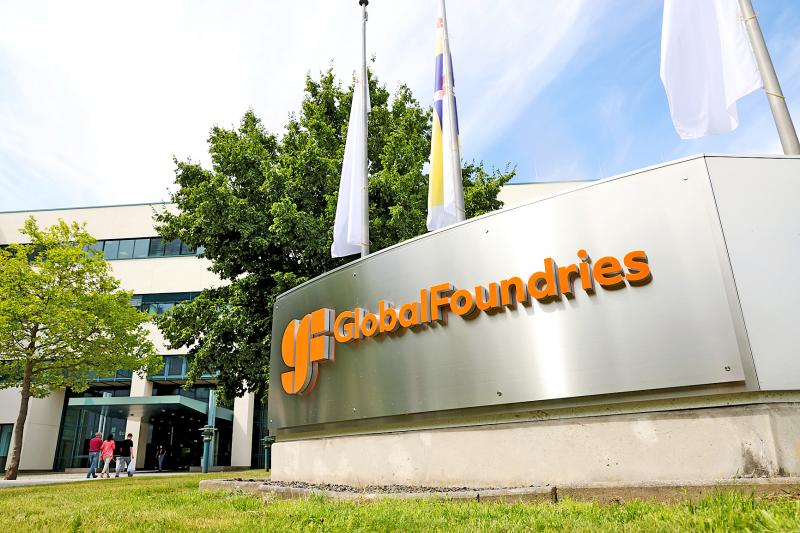GlobalFoundries Inc and major shareholder Mubadala Investment Co raised almost US$2.6 billion in an initial public offering (IPO), pricing the chipmaker’s shares at the top of a marketed range.
The company and Mubadala on Wednesday sold 55 million shares for US$47 each after marketing them for US$42 to US$47, according to a statement confirming an earlier report by Bloomberg News.
At US$47 a share, GlobalFoundries has a market value of more than US$25 billion based on the outstanding shares listed in its filings with the US Securities and Exchange Commission.

Photo: Bloomberg
The listing is the third biggest on a US exchange this year, topped only by South Korean e-commerce firm Coupang Inc’s US$4.55 billion IPO and Chinese ride-hailing company DiDi Global Inc’s (滴滴) US$4.44 billion raise, data compiled by Bloomberg showed. That does not include blank-check and similar companies.
GlobalFoundries is appealing to public-market investors as interest in the semiconductor industry hits an all-time high.
Shortages caused by a surge in demand for electronics during COVID-19 pandemic lockdowns and insufficient supply have made chip factories more valuable to the economy.
For the first half of the year, GlobalFoundries had a net loss of US$301 million on revenue of about US$3 billion, compared with a loss of US$534 million on US$2.7 billion in revenue a year earlier, according to the filings.
Contract chipmakers such as GlobalFoundries fabricate chips for large technology companies such as Apple Inc and Amazon.com Inc. Taiwan Semiconductor Manufacturing Co (TSMC, 台積電) and Samsung Electronics Co dominate the market, and Intel Corp has ambitions to become a bigger force in that area, too.
GlobalFoundries previously gave up on the kind of leading-edge production that would match the capabilities of TSMC or Samsung.
Instead, it is serving the market for less advanced chips, which are increasingly critical to automakers and other industries.

MULTIFACETED: A task force has analyzed possible scenarios and created responses to assist domestic industries in dealing with US tariffs, the economics minister said The Executive Yuan is tomorrow to announce countermeasures to US President Donald Trump’s planned reciprocal tariffs, although the details of the plan would not be made public until Monday next week, Minister of Economic Affairs J.W. Kuo (郭智輝) said yesterday. The Cabinet established an economic and trade task force in November last year to deal with US trade and tariff related issues, Kuo told reporters outside the legislature in Taipei. The task force has been analyzing and evaluating all kinds of scenarios to identify suitable responses and determine how best to assist domestic industries in managing the effects of Trump’s tariffs, he

TIGHT-LIPPED: UMC said it had no merger plans at the moment, after Nikkei Asia reported that the firm and GlobalFoundries were considering restarting merger talks United Microelectronics Corp (UMC, 聯電), the world’s No. 4 contract chipmaker, yesterday launched a new US$5 billion 12-inch chip factory in Singapore as part of its latest effort to diversify its manufacturing footprint amid growing geopolitical risks. The new factory, adjacent to UMC’s existing Singapore fab in the Pasir Res Wafer Fab Park, is scheduled to enter volume production next year, utilizing mature 22-nanometer and 28-nanometer process technologies, UMC said in a statement. The company plans to invest US$5 billion during the first phase of the new fab, which would have an installed capacity of 30,000 12-inch wafers per month, it said. The

Taiwan’s official purchasing managers’ index (PMI) last month rose 0.2 percentage points to 54.2, in a second consecutive month of expansion, thanks to front-loading demand intended to avoid potential US tariff hikes, the Chung-Hua Institution for Economic Research (CIER, 中華經濟研究院) said yesterday. While short-term demand appeared robust, uncertainties rose due to US President Donald Trump’s unpredictable trade policy, CIER president Lien Hsien-ming (連賢明) told a news conference in Taipei. Taiwan’s economy this year would be characterized by high-level fluctuations and the volatility would be wilder than most expect, Lien said Demand for electronics, particularly semiconductors, continues to benefit from US technology giants’ effort

‘SWASTICAR’: Tesla CEO Elon Musk’s close association with Donald Trump has prompted opponents to brand him a ‘Nazi’ and resulted in a dramatic drop in sales Demonstrators descended on Tesla Inc dealerships across the US, and in Europe and Canada on Saturday to protest company chief Elon Musk, who has amassed extraordinary power as a top adviser to US President Donald Trump. Waving signs with messages such as “Musk is stealing our money” and “Reclaim our country,” the protests largely took place peacefully following fiery episodes of vandalism on Tesla vehicles, dealerships and other facilities in recent weeks that US officials have denounced as terrorism. Hundreds rallied on Saturday outside the Tesla dealership in Manhattan. Some blasted Musk, the world’s richest man, while others demanded the shuttering of his